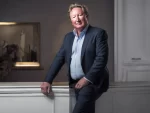Australian businessman John Andrew Henry Forrest AO, well known by his stage moniker Twiggy, was born on November 18, 1961. He is most recognised for serving as the former CEO and current non-executive chairman of Fortescue Metals Group (FMG), but he also has business interests in the mining sector and cattle ranching. Forrest was listed as the second richest Australian on the Financial Review 2023 Rich List with an estimated net worth of A$33.29 billion. Forrest, according to the Financial Review, was Australia's richest person in 2008.
The entirety of Andrew and Nicola Forrest's wealth was donated to charity in 2013, making them the first billionaires in Australia to do so. In 2011, he had resigned from his position as CEO of Fortescue Metals. The Minderoo Foundation, which focuses on education and Indigenous Australians, and the Walk Free Foundation, which focuses on eradicating modern slavery, were both founded by Forrest and have received the majority of his philanthropic contributions. After admitting in 2011 that Fortescue had never paid business tax, Forrest has been charged with evading payment.
Early Life Education And Career
John Andrew Henry Forrest, the youngest of Judith (née Fry) and Donald Forrest's three children, was born on November 18, 1961, in Perth, Western Australia. He had three managers: his father, grandpa (Mervyn), and great-grandfather (David), who had founded Minderoo Station with his brothers Alexander and John in 1878. John served as Western Australia's first premier while Alexander, David, and Mervyn all served in the legislature at various times. At Minderoo, which is situated in the Pilbara area south of Onslow, Forrest spent his formative years. Due to a persistent drought and bankruptcy, his father sold the Forrest family's ownership of Minderoo in 1998, but Forrest later acquired it back.
Before going to Perth to enrol in Christ Church Grammar School and then Hale School, Forrest received his education at Onslow Primary School and via the School of the Air. He had a childhood speech impediment, which is how he met Ian Black, whose Aboriginal father Scotty later served as Forrest's tutor. Forrest continued his education at the University of Western Australia, majoring in both politics and economics. Forrest wed Nicola Maurice in 1991; she was the daughter of Tony Maurice, a prominent member of the Australian League of Rights. David Thompson, who led the Australian League of Rights in the 1990s and the New Zealand League of Rights in the early 1980s, is married to Nicola's sister Katrina. David Thompson and Forrest became good business partners after Forrest appointed Thompson to a supervisory position while Thompson served on the Anaconda Nickel board.
Forrest worked as a stockbroker at Kirke Securities and Jacksons after receiving his degree. He gave up stockbroking and started Anaconda Nickel after realising that demand for stainless steel was growing at a rate of 4% annually. In 1993, he acquired a share in Anaconda Nickel and went on to become its first CEO. But in 2001, when the business was on the verge of failure, he lost his position as CEO. In the restructuring, US bondholders earned $0.26 for every dollar of debt. Before Glencore bought the firm and changed its name to Minara Resources, the company's shares decreased by 89%.
He assumed control of Allied Mining and Processing in April 2003 and changed its name to Fortescue Metals Group (FMG), which possessed the rights to iron ore in the Pilbara. Through his personal business, The Metal Group, he continues to be a significant shareholder in FMG.
Other
Forrest has many connections in the business, sports, and political worlds. He has the titles of fellow of the Australasian Institute of Mining & Metallurgy and adjunct professor at the Chinese Southern University. He was a former chairman of Athletics Australia as well as a former director of the Chamber of Minerals and Energy of Western Australia and the Export Finance and Insurance Corporation of Australia.
He has spoken at both Christians in the Marketplace and Queensland University of Technology. He presented a case for hydrogen energy in the Boyer Lecture of 2020 and discussed approaches to controlling how humans affect the seas.

